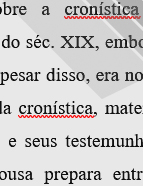

................................
Even António José Saraiva, who had been an exile in France since 1960 to escape the regime and had conducted research on the epic tradition of Afonso Henriques, would also become involved in disseminating the texts of Fernão Lopes in "modern Portuguese", of that chronicler in the collection Os Grandes Portugueses [Great Portuguese Figures], by Editora Arcádia [publishers] (1960), and of his chronicle in História da literatura portuguesa [History of Portuguese Literature] (1st ed. 1955), co-authored with Óscar Lopes. The critical editions of the Crónica de D. Pedro (1966) and D. Fernando (1975) were also published around this time by the hand of Giuliano Macchi, interestingly at the same time as another re-edition of the chronicle of King Pedro I, by Damião Peres (1965).
Other analyses of Zurara and Rui de Pina conducted by this chronicler appeared throughout the 1960s and 1970s, showing a clear trend in chronicle studies in Portugal. Nevertheless, other paths were being taken beyond this common theme. António Cruz, who was in charge of the Biblioteca Municipal do Porto at that time launched his research on the connection between Portuguese culture and Santa Cruz de Coimbra (1964), a work that announced the publication of the Anais, Crónicas e Memórias Avulsas de Santa Cruz de Coimbra [Annals, Chronicles and Sundry Memoirs of Santa Cruz de Coimbra] (1968), which included lesser-known texts such as the Livro das Eras [Book of Ages], an example of the hybridisation of chronicles and analyses. A year earlier, Fernando Peixoto da Fonseca (who later edited the Crónica Breve do Arquivo Nacional [Short Chronicle of the National Archives], in 1986, the Crónica da Fundação do Mosteiro de São Vicente [Chronicle of the Foundation of the Monastery of Saint Vincent], in 1995, and the so-called Crónicas Breves de Santa Cruz [Short Chronicles of Santa Cruz], in 2000) revised the chronicles included by Herculano in the Portugaliae Monumenta Historica, representing practically the first revision of a work still deemed untouchable. As previously mentioned, in 1962, Diego Catalán pursued the research initiated by Lindley Cintra and in 1970 published the first part of what was the original text of the Crónica de 1344, a work that remained incomplete, with a second volume that was never to be published.
